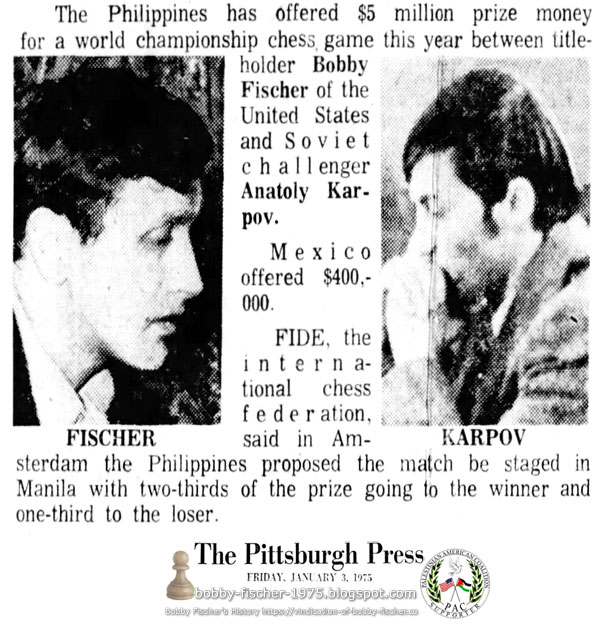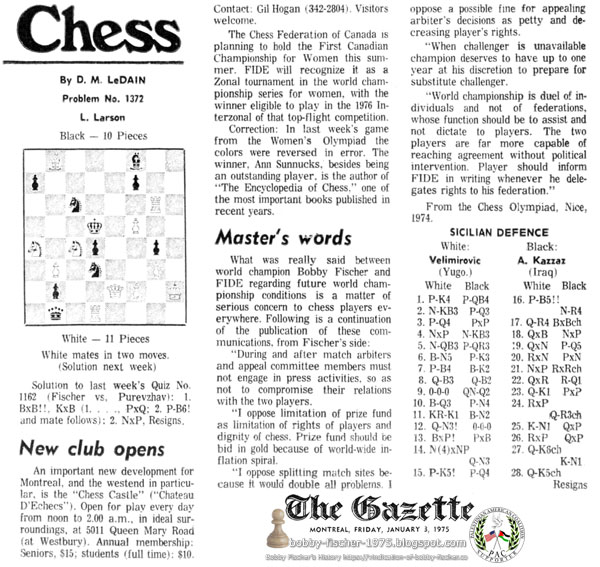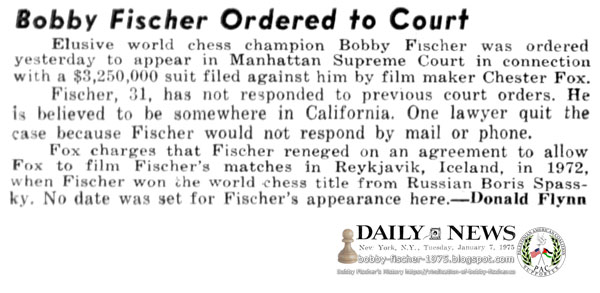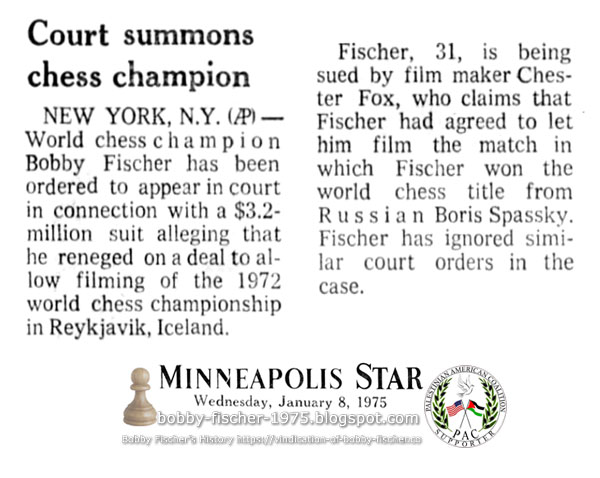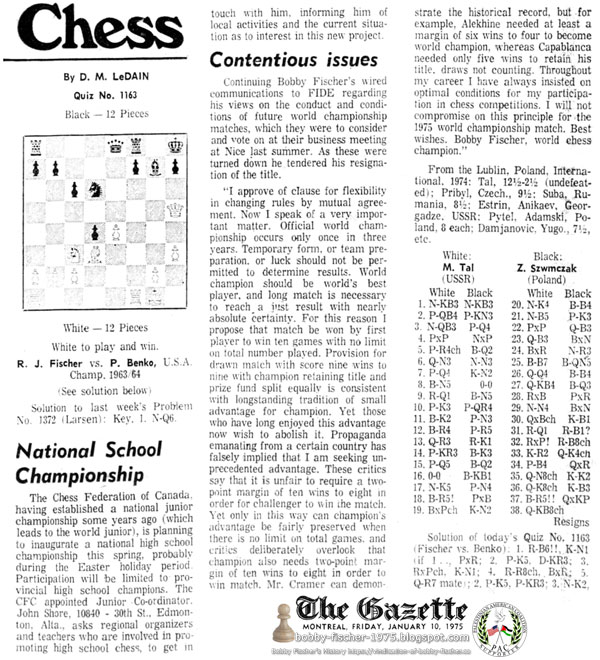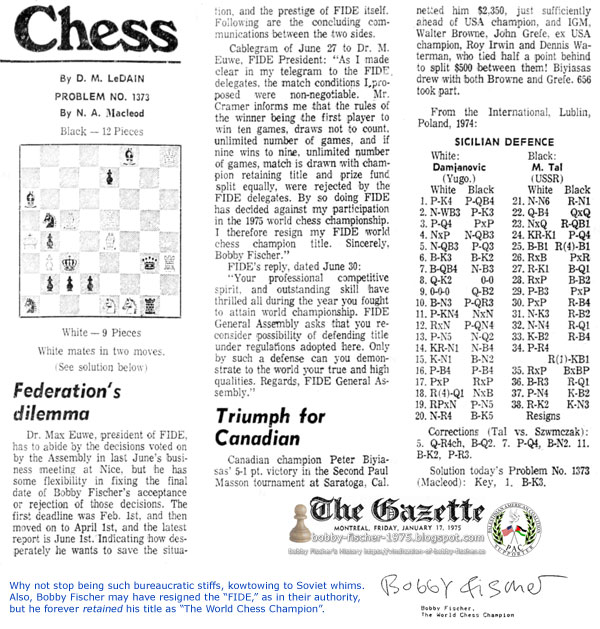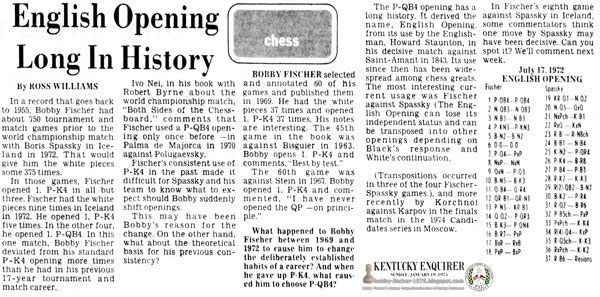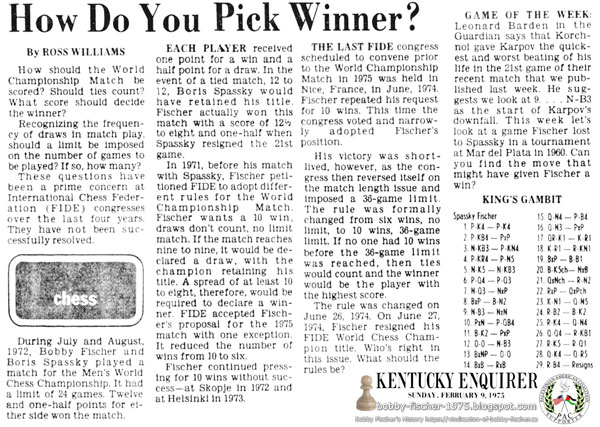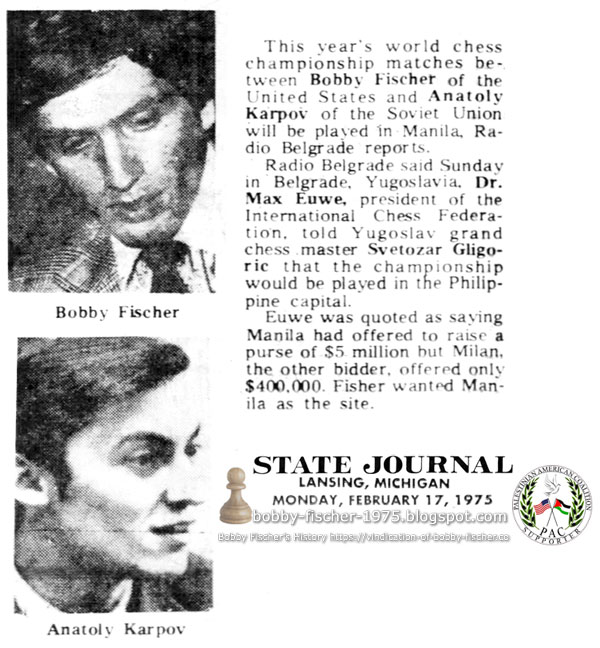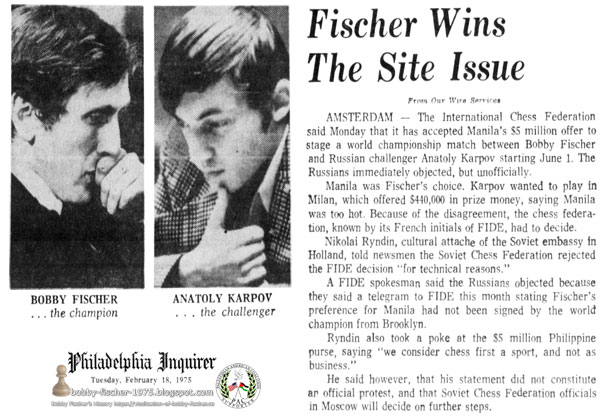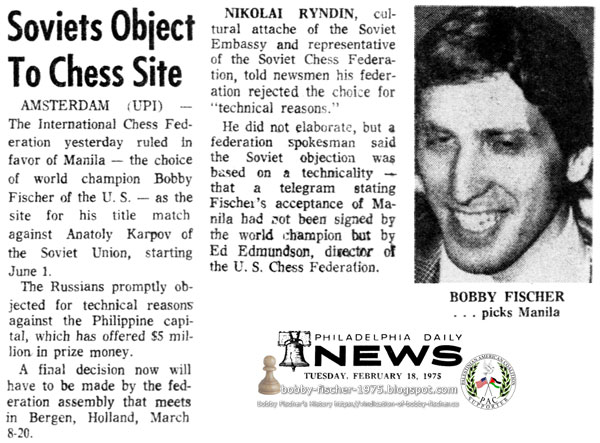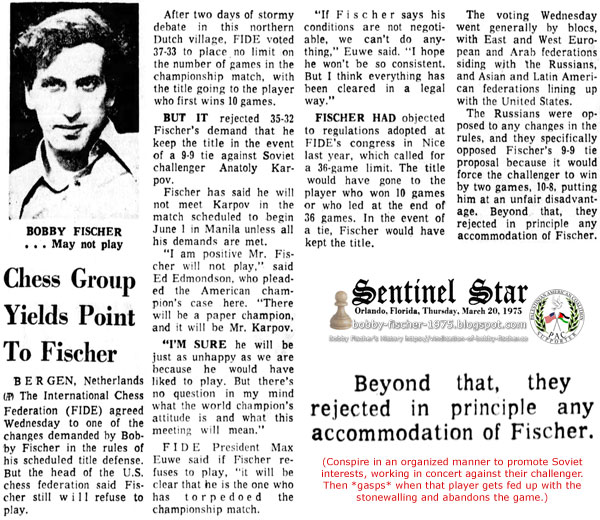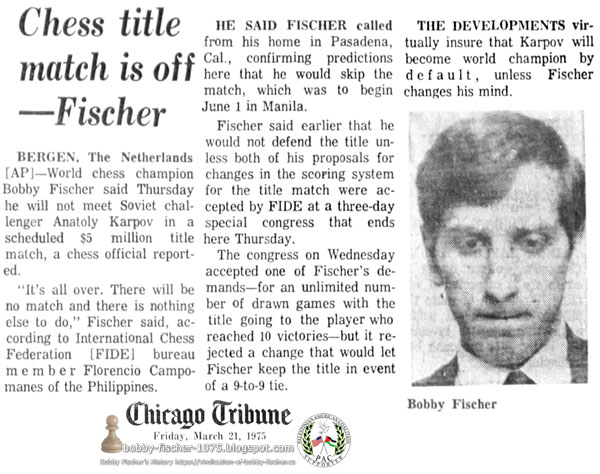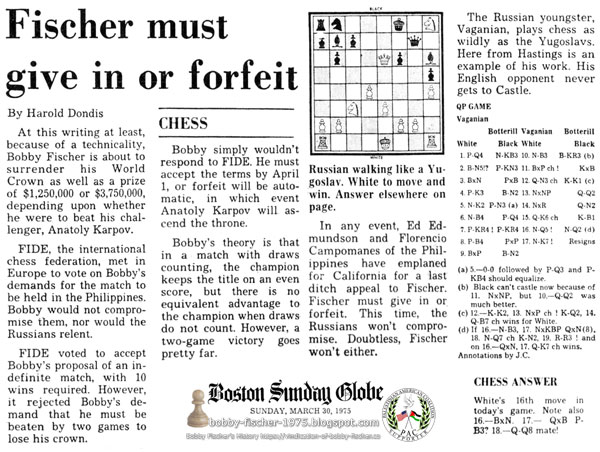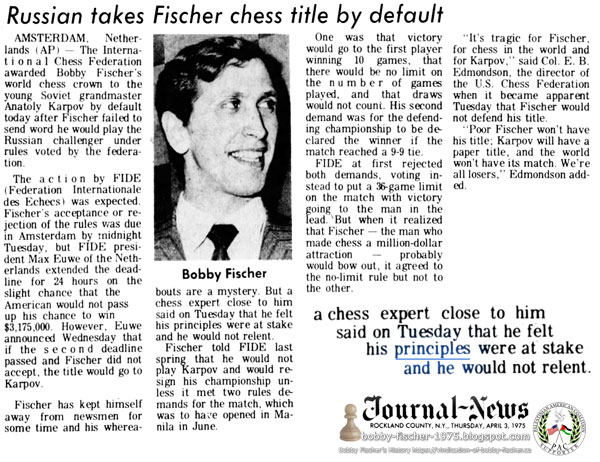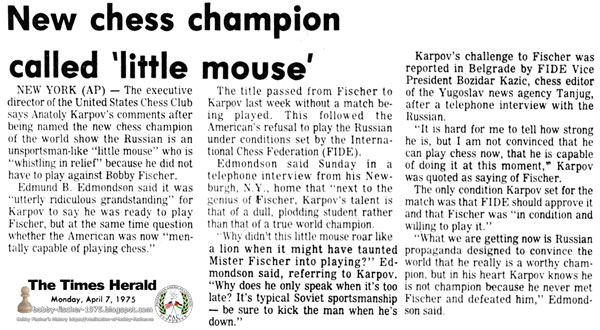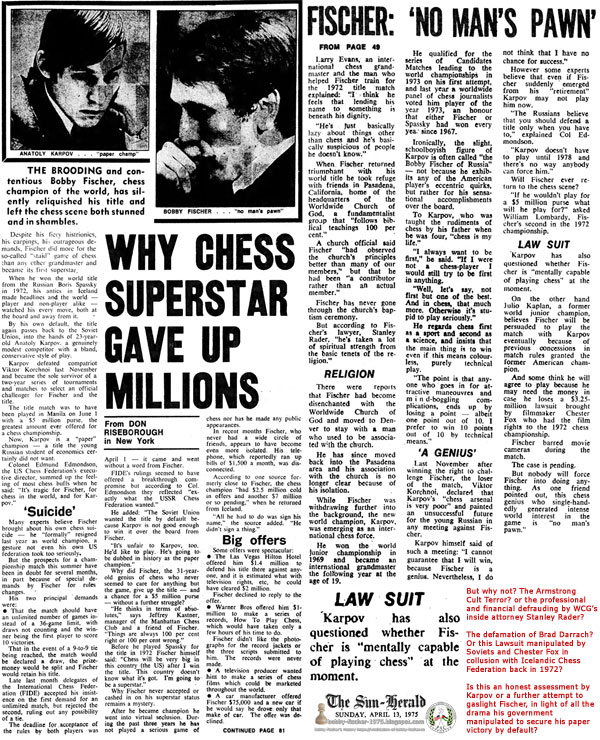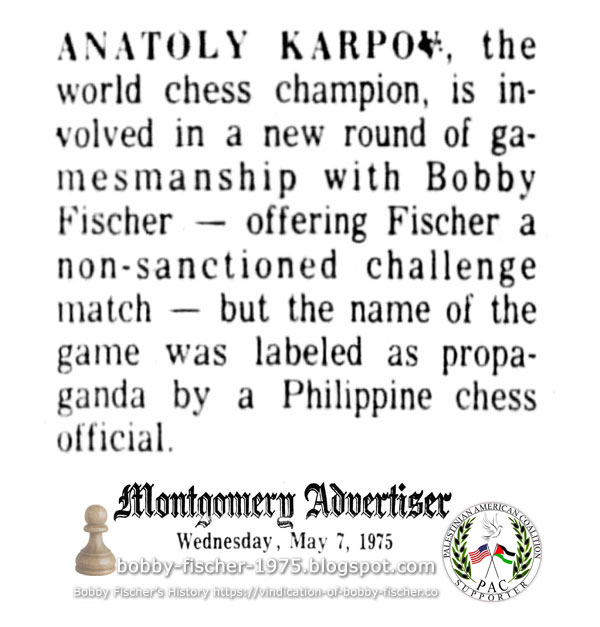The Pittsburgh Press Pittsburgh, Pennsylvania Friday, January 03, 1975 - Page 9
Philippines Offer for World Championship Chess
The Philippines has offered $5 million prize money for a world championship chess game this year between title-holder Bobby Fischer of the United States and Soviet challenger Anatoly Karpov.
Mexico offered $400,000.
FIDE, the international chess federation, said in Amsterdam the Philippines proposed the match be staged in Manila with two-thirds of the prize going to the winner and one-third to the loser.
The Gazette Montreal, Quebec, Quebec, Canada Friday, January 03, 1975 - Page 26
Master's Words
What was really said between world champion Bobby Fischer and FIDE regarding future world championship conditions is a matter of serious concern to chess players everywhere. Following is a continuation of the publication of these communications, from Fischer's side:
“During and after match arbiters and appeal committee members must not engage in press activities, so as not to compromise their relations with the two players.
“I oppose limitation of prize fund as limitation of rights of players and dignity of chess. Prize fund should be bid in gold because of world-wide inflation spiral.
“I oppose splitting match sites because it would double all problems. I oppose a possible fine for appealing arbiter's decisions as petty and decreasing player's rights.
“When challenger is unavailable champion deserves to have up to one year at his discretion to prepare for substitute challenger.
“World championship is duel of individuals and not of federations, whose function should be to assist and not dictate to players. The two players are far more capable of reaching agreement without political intervention. Player should inform FIDE in writing whenever he delegates rights to his federation.”
Daily News New York, New York Tuesday, January 07, 1975 - Page 64
Bobby Fischer Ordered to Court
Elusive world chess champion Bobby Fischer was ordered yesterday to appear in Manhattan Supreme Court in connection with a $3,250,000 suit filed against him by film maker Chester Fox.
Fischer, 31, has not responded to previous court orders. He is believed to be somewhere in California. One lawyer quit the case because Fischer would not respond by mail or phone.
Fox charges that Fischer reneged on an agreement to allow Fox to film Fischer's matches in Reykjavik, Iceland, in 1972, when Fischer won the world chess title from Russian Boris Spassky. No date was set for Fischer's appearance here. —Donald Flynn.
That contract was signed between Icelandic Chess Federation on behalf of USSR Soviet whims and Chester Fox. Chester Fox prohibited cameras in the playing hall. Chester Fox's legal representatives even made threats that AP and UPI reports of the match would be prohibited, as all coverage rights exclusively belonged to himself. Chester Fox and the Soviets didn't want coverage of the American beating the Soviet machinery. The agenda, was to censor coverage. None of these affairs were Bobby Fischer's choosing, so finally Bobby Fischer refused to play if Chester Fox's monopoly on camera rights remained in the playing hall. Fischer made no agreement with Chester Fox. Fox should have been suing the Icelandic Chess Federation! But the Soviets needed this haggling and drama, to further upset Fischer to forfeit competition in the 1975 World Tournament.
The Times Munster, Indiana Sunday, July 02, 1972
World Title Match in Secret
“…He [Bobby Fischer] also says the television coverage will be limited. If he beats Spassky, he doesn't see why it should be some kind of secret.”
The Minneapolis Star Minneapolis, Minnesota Wednesday, January 08, 1975 - Page 5
Court Summons Chess Champion
New York, N.Y. (AP)—World chess champion Bobby Fischer has been ordered to appear in court in connection with a $3.2-million suit alleging that he reneged on a deal to allow filming of the 1972 world chess championship in Reykjavik, Iceland.
Fischer, 31, is being sued by film maker Chester Fox, who claims that Fischer had agreed to let him film the match in which Fischer won the world chess title from Russian Boris Spassky. Fischer has ignored similar court orders in the case.
Did Fischer make any such agreements with Chester Fox? Chester Fox conspired with the Icelandic Chess Federation, whom sold broadcast rights to Chester Fox, without Bobby Fischer being made aware of the conditions, as is stated in the following media report:
The Vancouver Sun Vancouver, British Columbia, Canada Saturday, May 06, 1972 ★
“A spokesman for Fischer said Friday that he would play ‘under conditions of the Icelandic bid, as yet unseen by him, and in accordance with such rules as have been laid down by FIDE (International Chess Federation) as yet not clarified to him.’”These are the ruthless system of rules the Soviets played by, off the chessboard. Keep opponents so tied up in red tape, bureaucracy, hassle and distraction, they would have no time for honest competition. The history of Soviet cheating is well documented and testified to, not only by outside observers, but former Soviet players themselves.
The Gazette Montreal, Quebec, Quebec, Canada Friday, January 10, 1975 - Page 36
Contentious Issues
Continuing Bobby Fischer's wired communications to FIDE regarding his views on the conduct and conditions of future world championship matches, which they were to consider and vote on at their business meeting at Nice last summer. As these were turned down he tendered his resignation of the title.
“I approve of clause for flexibility in changing rules by mutual agreement. Now I speak of a very important matter. Official world championship occurs only once in three years. Temporary form, or team preparation, or luck should not be permitted to determine results. World champion should be world's best player, and long match is necessary to reach a just result with nearly absolute certainty. For this reason I propose that match be won by first player to win ten games with no limit on total number played. Provision for drawn match with score nine wins to nine with champion retaining title and prize fund split equally is consistent with longstanding tradition of small advantage for champion. Yet those who have long enjoyed this advantage now wish to abolish it. Propaganda emanating from a certain country has falsely implied that I am seeking unprecedented advantage. These critics say that it is unfair to require a two-point margin of ten wins to eight in order for challenger to win the match. Yet only in this way can champion's advantage be fairly preserved when there is no limit on total games, and critics deliberately overlook that champion also needs two-point margin of ten wins to eight in order to win match. Mr. Cramer can demonstrate the historical record, but for example, Alekhine needed at least a margin of six wins to four to become world champion, whereas Capablanca needed only five wins to retain his title, draws not counting. Throughout my career I have always insisted on optimal conditions for my participation in chess competitions. I will not compromise on this principle for the 1975 world championship match. Best wishes, Bobby Fischer, world chess champion.”
The Gazette Montreal, Quebec, Quebec, Canada Friday, January 17, 1975 - Page 41
Federation's Dilemma
Dr. Max Euwe, president of FIDE, has to abide by the decisions voted on by the Assembly in last June's business meeting at Nice, but has has some flexibility in fixing the final date of Bobby Fischer's acceptance or rejection of those decisions. The first deadline was Feb. 1st, and then moved to April 1st, and the latest Cablegram of June 27 to Dr. M. Euwe, FIDE President: “As I made clear in my telegram to the FIDE delegates, the match conditions I proposed were non-negotiable. Mr. Cramer informs me that the rules of the winner being the first player to win ten games, draws not to count, unlimited number of games, and if nine wins to nine, unlimited number of games, match is drawn with champion retaining title and prize fund split equally, were rejected by the FIDE delegates. By so doing FIDE has decided against my participation in the 1975 world chess championship. I therefore resign my FIDE world chess champion title. Sincerely, Bobby Fischer.”
FIDE's reply, dated June 30:
“Your professional competitive spirit, and outstanding skill have thrilled all during the year you fought to attain world championship. FIDE General Assembly asks that you reconsider possibility of defending title under regulations adopted here. Only by such a defense can you demonstrate to the world your true and high qualities. Regards, FIDE General Assembly.”
The Cincinnati Enquirer Cincinnati, Ohio Sunday, January 19, 1975 - Page 121
English Opening Long in History
In a record that goes back to 1955, Bobby Fischer had about 750 tournament and match games prior to the world championship match with Boris Spassky in Iceland in 1972. That would give him the white pieces some 375 times.
In those games, Fischer opened 1. P-K4 in all but three. Fischer had the white pieces nine times in Iceland in 1972. He opened 1. P-K4 five times. In the other four, he opened 1. P-QB4. In this one match, Bobby Fischer deviated from his standard P-K4 opening more times than he had in his previous 17-year tournament and match career.
Ivo Nei, in his book with Robert Byrne about the world championship match, “Both Sides of the Chessboard,” comments that Fischer used a P-QB4 opening only once before — in Palma de Majorca in 1970 against Polugaevsky.
Fischer's consistent use of P-K4 in the past made it difficult for Spassky and his team to know what to expect should Bobby suddenly shift openings.
This may have been Bobby's reason for the change. On the other hand, what about the theoretical basis for his previous consistency?
BOBBY FISCHER selected and annotated 60 of his games and published them in 1969. He had the white pieces 37 times and opened 1. P-K4 37 times. His notes are interesting. The 45th game in the book was against Bisguier in 1963. Bobby opens 1. P-K4 and comments, “Best by test.”
The 60th game was against Stein in 1967. Bobby opened 1. P-K4 and commented, “I have never opened the QP — on principle.”
What happened to Bobby Fischer between 1969 and 1972 to cause him to change the deliberately established habits of a career? And when he gave up P-K4, what caused him to choose P-QB4?
The P-QB4 opening has a long history. It derived the name, English Opening from its use by the Englishman, Howard Staunton, in his decisive match against Saint-Amant in 1843. Its use since then has been widespread among chess greats. The most interesting current usage was Fischer against Spassky (The English Opening can lose its independent status and can be transposed into other openings depending on Black's response and White's continuation.
(Transpositions occurred in three of the four Fischer-Spassky games.), and more recently by Korchnoi against Karpov in the finals match in the 1974 Candidates series in Moscow.
In Fischer's eighth game against Spassky in Iceland, some commentators think one move by Spassky may have been decisive. Can you spot it? We'll comment next week.
The Cincinnati Enquirer Cincinnati, Ohio Sunday, February 09, 1975 - Page 111
How Do You Pick Winner?
How should the World Championship Match be scored? Should ties count? What score should decide the winner?
Recognizing the frequency of draws in match play, should a limit be imposed on the number of games to be played? If so, how many?
These questions have been a prime concern at International Chess Federation (FIDE) congresses over the last four years. They have not been successfully resolved.
During July and August 1972, Bobby Fischer and Boris Spassky played a match for the Men's World Chess Championship. It had a limit of 24 games. Twelve and one-half points for either side won the match.
EACH PLAYER received one point for a win and a half point for a draw. In the event of a tied match, 12 to 12, Boris Spassky would have retained his title. Fischer actually won this match with a score of 12½ to eight and one-half when Spassky resigned the 21st game.
In 1971, before his match with Spassky, Fischer petitioned FIDE to adopt different rules for the World Championship Match. Fischer wants a 10 win, draws don't count, no limit match. If the match reaches nine to nine, it would be declared a draw, with the champion retaining his title. A spread of at least 10 to eight, therefore, would be required to declare a winner. FIDE accepted Fischer's proposal for the 1975 match with one exception. It reduced the number of wins from 10 to six.
Fischer continued pressing for 10 wins without success—at Skopje in 1972 and at Helsinki in 1973.
THE LAST FIDE congress scheduled to convene prior to the World Championship Match in 1975 was held in Nice, France, in June, 1974. Fischer repeated his request for 10 wins. This time the congress voted and narrowly adopted Fischer's position.
His victory was short-lived, however, as the congress then reversed itself on the match length issue and imposed a 36-game limit. The rule was formally changed from six wins, no limit, to 10 wins, 36-game limit. If no one had 10 wins before the 36-game limit was reached, then ties would count and the winner would be the player with the highest score.
The rule was changed on June 26, 1974. On June 27, 1974, Fischer resigned his FIDE World Chess Champion title. Who's right in this issue. What should the rules be?
Lansing State Journal Lansing, Michigan Monday, February 17, 1975 - Page 7
Manila Location of 1975 Championship
This Year's World Chess Championship matches between Bobby Fischer of the United States and Anatoly Karpov of the Soviet Union will be played in Manila, Radio Belgrade reports.
Radio Belgrade said Sunday in Belgrade, Yugoslavia, Dr. Max Euwe, president of the International Chess Federation, told Yugoslav grand chess master Svetozar Gligoric that the championship would be played in the Philippine capital.
Euwe was quoted as saying Manila had offered to raise a purse of $5 million but Milan, the other bidder, offered only $400,000. Fischer wanted Manila as the site.
The Philadelphia Inquirer Philadelphia, Pennsylvania Tuesday, February 18, 1975 - Page 25
Fischer Wins The Site Issue
Amsterdam — The International Chess Federation said Monday that it has accepted Manila's $5 million offer to stage a world championship match between Bobby Fischer and Russian challenger Anatoly Karpov starting June 1. The Russians immediately objected, but unofficially.
Manila was Fischer's choice. Karpov wanted to play in Milan, which offered $440,000 in prize money, saying Manila was too hot. Because of the disagreement, the chess federation, known by its French initials of FIDE, had to decide.
Nikolai Ryndin, cultural attache of the Soviet embassy in Holland, told newsmen the Soviet Chess Federation rejected the FIDE decision “for technical reasons.”
A FIDE spokesman said the Russians objected because they said a telegram to FIDE this month stating Fischer's preference for Manila had not been signed by the world champion from Brooklyn.
Ryndin also took a poke at the $5 million Philippine purse, saying “we consider chess first a sport, and not as business.”
He said however, that his statement did not constitute an official protest, and that Soviet Chess Federation officials in Moscow will decide on further steps.
When and by whom's discretion, was the tradition changed?
The Times Munster, Indiana Sunday, July 02, 1972:
“…THE WORLD champion has the right to pick the site of the championships,” says Fischer.
“Spassky wasn't even there when the international governing body chose the site. A Russian delegation was there and they picked the site.”
Philadelphia Daily News Philadelphia, Pennsylvania Tuesday, February 18, 1975 - Page 31
Soviets Object To Chess Site
Amsterdam (UPI) — The International Chess Federation yesterday ruled in favor of Manila — the choice of world champion Bobby Fischer of the U.S. — as the site for his title match against Anatoly Karpov of the Soviet Union, starting June 1.
The Russians promptly objected for technical reasons against the Philippine capital, which has offered $5 million in prize money.
A final decision now will have to be made by the federation assembly that meets in Bergen, Holland, March 8-20.
NIKOLAI RYNDIN, cultural attache of the Soviet Embassy and representative of the Soviet Chess Federation, told newsmen his federation rejected the choice for “technical reasons.”
He did not elaborate, but a federation spokesman said the Soviet objection was based on a technicality — that a telegram stating Fischer's acceptance of Manila had not been signed by the world champion but by Ed Edmondson, director of the U.S. Chess Federation.
The Orlando Sentinel Orlando, Florida Thursday, March 20, 1975 - Page 37
Chess Group Yields Point To Fischer
Bergen, Netherlands (AP) The International Chess Federation (FIDE) agreed Wednesday to one of the changes demanded by Bobby Fischer in the rules of his scheduled title defense. But the head of the U.S. chess federation said Fischer still will refuse to play.
After two days of stormy debate in this northern Dutch village, FIDE voted 37-33 to place no limit on the number of games in the championship match, with the title going to the player who first wins 10 games.
BUT IT rejected 35-32 Fischer's demand that he keep the title in the event of a 9-9 tie against Soviet challenger Anatoly Karpov.
Fischer has said he will not meet Karpov in the match scheduled to begin June 1 in Manila unless all his demands are met.
“I am positive Mr. Fischer will not play,” said Ed Edmondson, who pleaded the American champion's case here. “There will be a paper champion, and it will be Mr. Karpov.”
“I'M SURE he will be just as unhappy as we are because he would have liked to play. But there's no question in my mind what the world champion's attitude is and what this meeting will mean.”
FIDE President Max Euwe said if Fischer refuses to play, “it will be clear that he is the one who has torpedoed the championship match.
[EDITING NOTE: “it will be clear that THE SOVIETS ARE SOLELY RESPONSIBLE FOR torpedoing both the 1972 and 1975 championship matches.”]“If Fischer says his conditions are not negotiable, we can't do anything,” Euwe said.
[EDITING NOTE: Yes, you could, but you refused, because you were more interested in Soviet designs on the chess crown than fair competition.]“I hope he won't be so consistent. But I think everything has been cleared in a legal way.”
[EDITING NOTE: Legal. Such as Chester Fox slipped into the fine print without Fischer knowing anything about it. If Fischer refused to do things the “Soviet way” Chester Fox would come at Fischer, off the chessboard with a multi-million dollar lawsuit… after Chester Fox forbid cameras in the playing hall, trying to impose a monopoly on all broadcast rights, to achieve Soviet censorship of the American challenger, beating the Soviet machinery. But history was carefully rewritten to blame Bobby Fischer as the only culprit. “Legal” muddling to discourage fair competition. It was Euwe, who stamped his approval on torpedoing both the 1972 and 1975 match, and all for Soviet interests!]FISCHER HAD objected to regulations adopted at FIDE's congress in Nice last year, which called for a 36-game limit. The title would have gone to the player who won 10 games or who led at the end of 36 games. In the event of a tie, Fischer would have kept the title.
The voting Wednesday went generally by blocs, with East and West European and Arab federations siding with the Russians, and Asian and Latin American federations lining up with the United States.
The Russians were opposed to any changes in the rules, and they specifically opposed Fischer's 9-9 tie proposal because it would force the challenger to win by two games, 10-8, putting him at an unfair disadvantage. Beyond that, they rejected in principle any accommodation of Fischer.
Chicago Tribune Chicago, Illinois Friday, March 21, 1975 - Page 4
Chess title match is off —Fischer
Bergen, The Netherlands (AP)—World chess champion Bobby Fischer said Thursday he will not meet Soviet challenger Anatoly Karpov in a scheduled $5 million title match, a chess official reported.
“It's all over. There will be no match and there is nothing else to do,” Fischer said, according to International Chess [FIDE] bureau member Florencia Campomanes of the Philippines.
HE SAID FISCHER called from his home in Pasadena, Cal., confirming predictions here that he would skip the match, which was to begin June 1 in Manila.
Fischer said earlier that he would not defend the title unless both of his proposals for changes in the scoring system for the title match were accepted by FIDE at a three-day special congress that ends here Thursday.
The congress on Wednesday accepted one of Fischer's demands—for an unlimited number of drawn games with the title going to the player who reached 10 victories—but it rejected a change that would let Fischer keep the title in event of a 9-to-9 tie.
THE DEVELOPMENTS virtually insure that Karpov will become world champion by default, unless Fischer changes his mind.
No effort was spared by Soviets pulling strings in FIDE in refusal to cooperate with Fischer, to intimidate, distract, create confusion in media with Brad Darrach's 1974 book of defamatory rumors, Chester Fox's “lawsuit,” — tied up in drama, more drama, and red tape to destroy Bobby Fischer's peace of mind and force him out of chess by his own resignation so that as they rewrote history and they could blame Fischer. All by design.
The Boston Globe Boston, Massachusetts Sunday, March 30, 1975 - Page 80
Soviets Must Quit Trying to Stall Championship on Silly Technicalities
At this writing at least because of a technicality, Bobby Fischer is about to surrender his World Crown as well as a prize of $1,250,000 or $3,750,000, depending upon whether he were to beat his challenger, Anatoly Karpov.
FIDE, the international chess federation, met in Europe to vote on Bobby's demands for the match to be held in the Philippines. Bobby would not compromise them, nor would the Russians relent.
FIDE voted to accept Bobby's proposal of an indefinite match, with 10 wins required. However, it rejected Bobby's demand that he must be beaten by two games to lose his crown.
Bobby simply wouldn't respond to FIDE. He must accept the terms by April 1, or forfeit will be automatic, in which event Anatoly Karpov will ascend the throne.
Bobby's theory is that in a match with draws counting, the champion keeps the title on an even score, but there is no equivalent advantage to the champion when draws do not count. However, a two-game victory goes pretty far.
In any event, Ed Edmundson and Florencio Campomanes of the Philippines have emplaned for California for a last ditch appeal to Fischer. Fischer must give in or forfeit. This time, the Russians won't compromise. Doubtless, Fischer won't either.
The Journal News White Plains, New York Thursday, April 03, 1975 - Page 5
Russian Takes Fischer Chess Title by Default
Amsterdam, Netherlands (AP) — The International Chess Federation awarded Bobby Fischer's world chess crown to the young Soviet grandmaster Anatoly Karpov by default today after Fischer failed to send word he would play the Russian challenger under rules voted by the federation.
The action by FIDE (Federation Internationale des Echecs) was expected. Fischer's acceptance or rejection of the rules was due in Amsterdam by midnight Tuesday, but FIDE president Max Euwe of the Netherlands extended the deadline for 24 hours on the slight chance that the American would not pass up his chance to win $3,175,000. However, Euwe announced Wednesday that if the second deadline passed and Fischer did not accept, the title would go to Karpov.
Fischer has kept himself away from newsmen for some time and his whereabouts are a mystery. But a chess expert close to him said on Tuesday that he felt his principles were at stake and he would not relent.
Fischer told FIDE last spring that he would not play Karpov and would resign his championship unless it met two rules demands for the match, which was to have opened in Manila in June.
One was that victory would go to the first player winning 10 games, that there would be no limit on the number of games played, and that draws would not count. His second demand was for the defending champion to be declared the winner if the match reached a 9-9 tie.
FIDE at first rejected both demands, voting instead to put a 36-game limit on the match with victory going to the man in the lead. But when it realized that Fischer — the man who made chess a million-dollar attraction — probably would bow out, it agreed to the no-limit rule but not to the other.
“It's tragic for Fischer, for chess in the world and for Karpov,” said Col. E.B. Edmondson, the director of the U.S. Chess Federation when it became apparent Tuesday that Fischer would not defend his title.
“Poor Fischer won't have his title; Karpov will have a paper title, and the world won't have its match. We're all losers,” Edmondson added.
The Times Herald Port Huron, Michigan Monday, April 07, 1975 - Page 2
New Chess Champion Called 'Little Mouse'
New York (AP) — The executive director of the United States Chess Club says Anatoly Karpov's comments after being named the new chess champion of the world show the Russian is an unsportsman-like “little mouse” who is “whistling in relief” because he did not have to play against Bobby Fischer.
Edmund B. Edmondson said it was “utterly ridiculous grandstanding” for Karpov to say he was ready to play Fischer, but at the same time question whether the American was now “mentally capable of playing chess.”
The title passed from Fischer to Karpov last week without a match being played. This followed this American's refusal to play the Russian under conditions set by the International Chess Federation (FIDE).
Edmondson said Sunday in a telephone interview from his Newburgh, N.Y. home that “next to the genius of Fischer, Karpov's talent is that of a dull, plodding student rather than that of a true world champion.
“Why didn't this little mouse roar like a lion when it might have taunted Mister Fischer into playing?” Edmondson said, referring to Karpov. “Why does he only speak when it's too late? It's typical Soviet sportsmanship—be sure to kick the man when he's down.”
Karpov's challenge to Fischer was reported in Belgrade by FIDE Vice President Bozidar Kazic, chess editor of the Yugoslav news agency Tanjug, after a telephone interview with the Russian.
“It is hard for me to tell how strong he is, but I am not convinced that he can play chess now, that he is capable of doing it at this moment,” Karpov was quoted as saying of Fischer.
The only condition Karpov set for the match was that FIDE should approve it and that Fischer was “in condition and willing to play it.”
“What we are getting now is Russian propaganda designed to convince the world that he really is a worthy champion, but in his heart Karpov knows he is not champion because he never met Fischer and defeated him,” Edmondson said.
“Karpov has also questioned whether Fischer is ‘mentally capable of playing chess’ at the moment.”
But why not? The Armstrong Cult Terror? or the professional and financial defrauding by WCG’s inside attorney Stanley Rader?
The defamation of Brad Darrach? Or this Lawsuit manipulated by Soviets and Chester Fox in collusion with Icelandic Chess Federation back in 1972?
Is this an honest assessment by Karpov or a further attempt to gaslight Fischer, in light of all the drama his government manipulated to secure his paper victory by default?
The Sydney Morning Herald, Sydney, New South Wales, Australia, Sunday, April 13, 1975 - Page 49 (★)
Fischer: 'No Man's Pawn': Why Chess Superstar Gave Up Millions
THE BROODING and contentious Bobby Fischer, chess champion of the world, has silently relinquished his title and left the chess scene both stunned and in shambles.
Despite his fiery histrionics, his carpings, his outrageous demands, Fischer did more for the so-called “staid” game of chess than any other grandmaster and became its first superstar.
When he won the world title from the Russian Boris Spassky in 1972, his antics in Iceland made headlines and the world — player and non-player alike — watched his every move, both at the board and away from it.
By his own default, the title again passes back to the Soviet Union, into the hands of 23-year-old Anatoly Karpov, a genuinely modest competitor with a bland, conservative style of play.
Karpov defeated compatriot Viktor Korchnoi last November and became the sole survivor of a two-year series of tournaments and matches to select an official challenger for Fischer and the title.
The title match was to have been played in Manila on June 1 with a $5 million purse, the greatest amount ever offered for a chess championship.
Now, Karpov is a “paper” champion — a title the young Russian student of economics certainly did not want.
Colonel Edmund Edmondson, the US Chess Federation's executive director, summed up the feeling of most chess buffs when he said: “It's tragic for Fischer, for chess in the world, and for Karpov.”
‘Suicide’
Many experts believe Fischer brought about his own chess suicide — he “formally” resigned last year as world champion, a gesture not even his own US federation took too seriously.
But the prospects for a championship match this summer have been in doubt for several months, in part because of special demands by Fischer for rules changes.
His two principal demands were:
• That the match should have an unlimited number of games instead of a 36-game limit, with draws not counting and the winner being the first player to score 10 victories.
That in the event of a 9-to-9 tie being reached, the match would be declared a draw, the prize-money would be split and Fischer would retain his title.
Late last month delegates of the International Chess Federation (FIDE) accepted his insistence on the first demand for an unlimited match, but rejected the second, ruling out any possibility of a tie.
The deadline for acceptance of the rules by both players was April 1 — it came and went without a word from Fischer.
FIDE's rulings seemed to have offered a breakthrough compromise but according to Col. Edmondson they reflected “exactly what the USSR Chess Federation wanted.”
He added: “The Soviet Union wanted the title by default because Karpov is not good enough to win it over the board from Fischer.
“It's unfair to Karpov, too. He'd like to play. He's going to be dubbed in history as the paper champion.”
Why did Fischer, the 31-year-old genius of chess who never seemed to care for anything but the game, give up the title — and a chance for a $5 million purse — without a further struggle?
“He thinks in terms of absolutes,” says Jeffrey Kastner, manager of the Manhattan Chess Club and a friend of Fischer. “Things are always 100 per cent right or 100 per cent wrong.”
Before he played Spassky for the title in 1972 Fischer himself said: “Chess will be very big in this country (the US) after I win the title. This country doesn't know what it's got. I'm going to be a superstar.”
Why Fischer never accepted or cashed in on his superstar status remains a mystery.
After he became champion he went into virtual seclusion. During the past three years he has not played a serious game of chess nor has he made any public appearances.
In recent months Fischer, who never had a wide circle of friends, appears to have become even more isolated. His telephone, which reportedly ran up bills of $1,500 a month, was disconnected.
According to one source formerly close to Fischer, the chess champion “had $2.5 million cold in offers and another $7 million or so pending,” when he returned from Iceland.
“All he had to do was sign his name,” the source added. “He didn't sign a thing.”
Big offers
Some offers were spectacular:
• The Las Vegas Hilton Hotel offered him $1.4 million to defend his title there against anyone, and it is estimated what with television rights, etc, he could have cleared $2 million.
Fischer declined to reply to the offer.
• Warner Bros offered him $1 million to make a series of records, How To Play Chess, which would have taken only a few hours of his time to do.
Fischer didn't like the photographs for the record jackets or the three scripts submitted to him. The records were never made.
• A television producer wanted him to make a series of chess films which could be marked throughout the world.
• A car manufacturer offered Fischer $75,000 and a new car if he would say he drove only that make of car. The offer was declined.
Larry Evans, an international chess grandmaster and the man who helped Fischer train for the 1972 title match explained: “I think he feels that lending his name to something is beneath his dignity.”
“He's just basically lazy about things other than chess and he's basically suspicious of people he doesn't know.”
When Fischer returned triumphant with his world title he took refuge with friends in Pasadena, California, home of the headquarters of the Worldwide Church of God, a fundamentalist group that “follows biblical teachings 100 per cent.”
A church official said Fischer “had observed the church's principals better than many of our members,” but that he had been “a contributor rather than an actual member.”
Fischer has never gone through the church's baptism ceremony.
But according to Fischer's lawyer, Stanley Rader, “he's taken a lot of spiritual strength from the basic tenets of the religion.”
RELIGION
There were reports that Fischer had become disenchanted with the Worldwide Church of God and moved to Denver to stay with a man who used to be associated with the church.
He has since moved back into the Pasadena area and his association with the church is no longer clear because of his isolation.
While Fischer was withdrawing further into the background, the new world champion, Karpov, was emerging as an international chess force.
He won the world junior championship in 1969 and became an international grandmaster the following year at the age of 19.
He qualified for the series of Candidates Matches leading to the world championships in 1973 on his first attempt, and last year a worldwide panel of chess journalists voted him player of the year 1973, an honor that either Fischer or Spassky had won every year since 1967.
Ironically, the slight school-boyish figure of Karpov is often called “the Bobby Fischer of Russia” — not because he exhibits any of the American player's eccentric quirks, but rather for his sensational accomplishments over the board.
To Karpov, who was taught the rudiments of chess by his father when he was four, “chess is my life.”
“I always want to be first,” he said. “If I were not a chess-player I would still try to be first in anything.
“Well, let's say, not first but one of the best. And in chess, that much more. Otherwise it's stupid to play seriously.”
He regards chess first as a sport and second as a science, and insists that the main thing is to win even if this means colorless, purely technical play.
“The point is that anyone who goes in for attractive maneuvers and mind-boggling complications, ends up by losing a point — albeit one point out of 10. I prefer to win 10 points out of 10 by technical means.”
‘A Genius’
Last November, after winning the right to challenge Fischer, the loser of the match, Viktor Korchnoi, declared that Karpov's “chess arsenal is very poor” and painted an unsuccessful future for the young Russian in any meeting against Fischer.
Karpov himself said of such a meeting: “I cannot guarantee that I will win, because Fischer is a genius. Nevertheless, I do not think that I have no chance for success.”
However, some experts believe that even if Fischer suddenly emerged from his “retirement” Karpov may not play him now.
“The Russians believe that you should defend a title only when you have to,” explained Col Edmondson.
“Karpov doesn't have to play until 1978 and there's no way anybody can force him.”
Will Fischer ever return to the chess scene?
“If he wouldn't play for $5 million purse what will he play for?” asked William Lombardy, Fischer's second in the 1972 championship.
LAW SUIT
Karpov has also questioned whether Fischer is “mentally capable of playing chess” at the moment.
On the other hand Julio Kaplan, a former world junior champion, believes Fischer will be persuaded to play the match with Karpov eventually because of previous concessions in match rules granted the former American champion.
And some think he will agree to play because he may need the money in case he loses a $3.25-million lawsuit brought by filmmaker Chester Fox who had the film rights to the 1972 chess championship.
Fischer barred move cameras during the match.
The case is pending.
But nobody will force Fischer into doing anything. As one friend pointed out, this chess genius who single-handedly generated intense world interest in the game is “no man's pawn.”
The Montgomery Advertiser Montgomery, Alabama Wednesday, May 07, 1975 - Page 1
Anatoly Karpov, Propaganda
Anatoly Karpov, the world chess champion, is involved in a new round of gamesmanship with Bobby Fischer — offering Fischer a non-sanctioned challenge match — but the name of the game was labeled as propaganda by a Philippine chess official.











